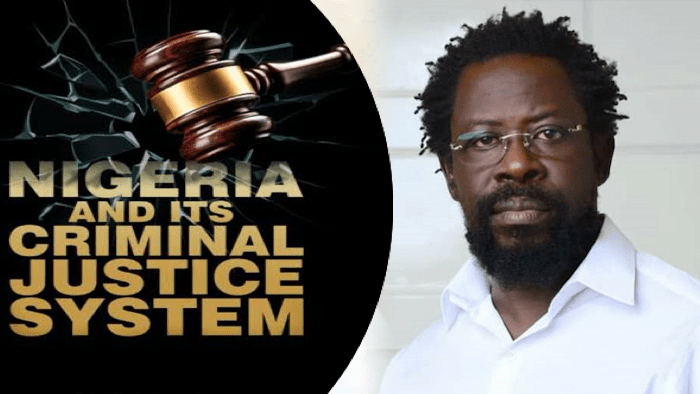In a country that prides itself on being a democracy, the arrest and detention of human rights lawyer and activist Dele Farotimi send a chilling message about the state of free speech in Nigeria.
Farotimi, a vocal critic of systemic injustice, is the author of “Nigeria and Its Criminal Justice System”, a book that boldly exposes the entrenched corruption and abuse of power within the nation’s legal framework. His detention, allegedly linked to this publication, is a stark illustration of the lengths to which those in power will go to suppress dissent. This event not only brings his book into the spotlight but also raises questions about the state of Nigeria’s democracy, the role of its criminal justice system, and the treatment of individuals who dare to challenge the status quo.
Farotimi’s “Nigeria and Its Criminal Justice System” is more than a critique of the judiciary, it is a searing indictment of a system designed to favor the powerful at the expense of the powerless. Drawing from his experiences as a lawyer, including legal battles with prominent figures like Chief Afe Babalola, Farotimi unveils the dark underbelly of Nigeria’s justice system. He exposes how systemic corruption, selective application of the law, and impunity have eroded public trust in the very institutions meant to uphold justice. The book’s unflinching narrative has made it a target for backlash, as it names individuals and details systemic failures with a clarity that leaves no room for ambiguity. This transparency, while commendable, has ruffled feathers in high places, leading to his recent arrest.
Dele Farotimi’s arrest is a grim reminder of the perils faced by those who challenge the system in Nigeria. Prominent activists like Inibehe Effiong and Omoyele Sowore have decried this move, highlighting the sinister undertones of silencing a man whose only “crime” is advocating for justice and reform.
Reports suggest that Farotimi had been receiving threats from influential figures, including Chief Afe Babalola, and other key players in government circles. The arrest, therefore, appears to be part of a broader strategy to intimidate and discredit him. However, rather than stifle his message, this incident has amplified it, drawing national and international attention to the issues he raises in his book.
Farotimi’s book has now become a symbol of resistance against oppression and a rallying cry for justice. Its significance lies not just in its content but in the broader context of its publication and the events surrounding it. The book peels back the layers of dysfunction in Nigeria’s judiciary, exposing how it perpetuates inequality and serves as a tool for the powerful. Farotimi’s accounts are backed by lived experiences, making his critique both credible and urgent.
In an environment where many critics prefer to speak in abstractions, Farotimi’s decision to name individuals and institutions responsible for systemic abuse is courageous. This level of accountability is rare and necessary for meaningful reform. Beyond criticism, the book serves as a call to action. It challenges readers to demand accountability, push for reforms, and resist the normalization of injustice.
Farotimi’s ordeal is not an isolated case. It is part of a larger trend of suppressing dissent in Nigeria, where artists, writers, and activists often face persecution for expressing inconvenient truths. Against the backdrop of the foregoing viewpoint, it is germane in this context to recall that Idris Abdulkareem’s “Jaga Jaga” was vilified by the government for criticizing corruption and poverty.
In a similar vein, Chinua Achebe’s “There Was a Country” faced backlash for its candid account of the Nigerian Civil War and critique of political leadership.
Also, “Onyeka Onwenu’s Niger Delta documentary” drew ire for spotlighting environmental degradation and exploitation in the oil-rich region.
These instances highlight a worrying pattern: those who hold a mirror to society are often met with hostility rather than engagement. It is unfortunate that a country which prides itself as a democratic nation has over the years been relishing in stifling opposing voices. This, no doubt, contradicts the fact that a healthy democracy thrives on open dialogue, constructive criticism, and the exchange of ideas. Unfortunately, silencing dissent does not eliminate the issues raised; it only deepens public disillusionment and distrust.
The Nigerian Constitution guarantees freedom of expression, yet incidents like Farotimi’s arrest reveal the fragility of this promise. The government must recognize that dissent is not a threat but a catalyst for growth and reform. In fact, Dele Farotimi’s arrest is a clarion call for Nigerians to rally around the principles of free speech and justice. Civil society organizations, human rights advocates, and ordinary citizens must demand his release and insist on accountability from the government. Moreover, by reading and sharing “Nigeria and Its Criminal Justice System”, Nigerians can amplify Farotimi’s message and ensure that his work reaches the widest possible audience. The book is not just a critique; it is a blueprint for change, offering insights and solutions to the issues plaguing the nation.
Though this writer has not been able to lay his hands on the book, but from information gathered so far concerning the book, it is a must-read. Nigeria stands at a crossroads. The arrest of Dele Farotimi presents an opportunity for the nation to reaffirm its commitment to democratic principles or risk sliding further into authoritarianism. The choice lies in how the government responds, not just to Farotimi’s case, but to the broader call for justice and reform. As citizens, we must resist the silencing of voices that speak truth to power. By supporting individuals like Farotimi, we uphold the ideals of democracy and pave the way for a better, more just Nigeria. Let us ensure that freedom of speech and expression triumphs, for it is the bedrock of any society that dares to call itself free.
By Isaac Asabor



